Will France 24 Be Seen in Philadelphia Again

Click to browse

On the streets of Perpignan, a French town just a few miles away from the border with Kingdom of spain, Ariane Forgues asks the question for the thousandth time. Maybe ten thousandth. Who knows. At this point the question has been at the tip of her tongue for 135 days: "What kind of European Marriage do you desire to see?"
A piddling more than than l years ago, Salvador Dalí froze in Perpignan's train station, looked up at the ceiling, and had a vision. "An example of a cosmogenic ecstasy," as he later described it, "I had a precise vision of the constitution of the universe." And Perpignan was at its heart, the ground zippo of the looming ending that he foresaw, inextricably linked with the disappearance, or the abduction, of Europe.
And now, as Europe teeters on multiple edges, beset past the rise forces of nationalism and populism, Ariane and her boyfriend and travel companion Baptiste Enaud are trying to figure out how to keep Dali's vision confined to the world of colour splashed on sail.
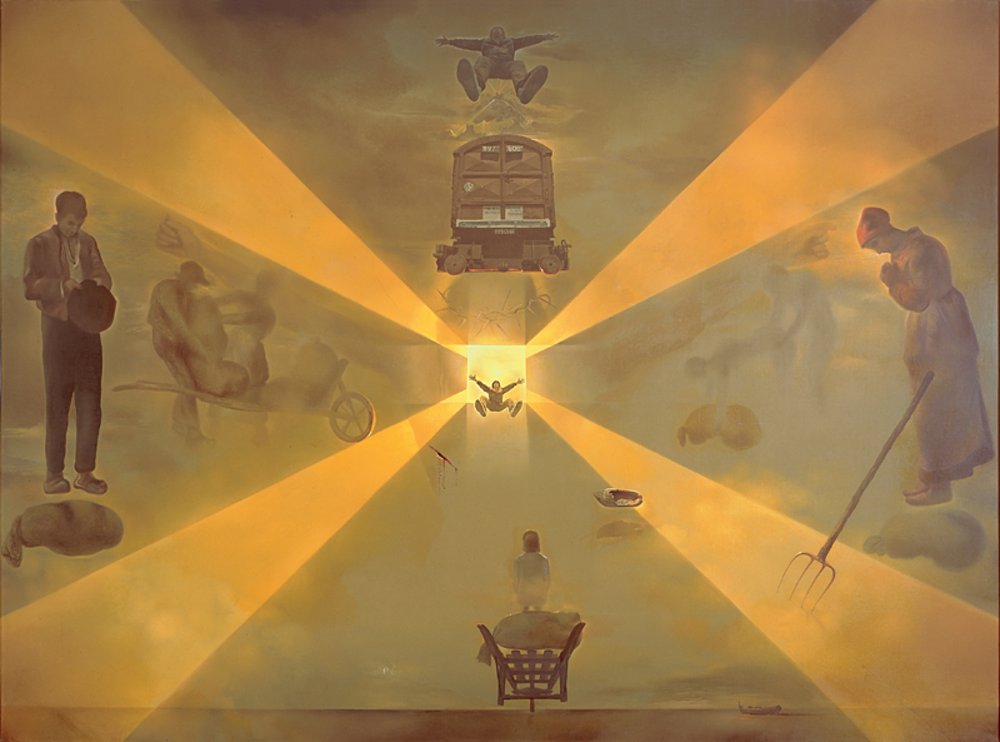
Salvador Dalí, La gare de Perpignan (The Station of Perpignan), 1965, oil on canvas, 295 x 406 cm, © Salvador Dalí, Gala-Salvador Dalí Foundation / © VG Bild-Kunst, Bonn 2013, Photograph: Rheinisches Bildarchiv Köln
What kind of Eu exercise you desire to encounter?
This time, the question is directed at Gerard Lesaine, a retiree whose gray hair flaps in the wind as he waits to cross a busy intersection underneath a dreary sky.
"I want to read more than positive things nearly Europe in the media," Gerard says. "For hundreds of years, we fought with the Germans, and now...? He lets the sentence trail off, the implicit word peace filling the pause. "It'due south beautiful, isn't information technology?" He suggests that Europe should be better taught in schools—a mutual refrain during the afternoon. "We're already Europeans, but the politics need to be explained better."
"Isn't it crazy," Ariane throws out, "that the French media spends more time on explaining the American midterm elections that it does on European elections?"
The chat shifts to the state of the earth, insecurity everywhere, Donald Trump, and the idea of some common European defence strength. Now that Trump is in ability, people have much more to say nearly European defence force the pair tell me later. They are keeping a behemothic Excel spreadsheet, chock-full of every thought and proffer that they run across along their fashion: like beginning language education at a younger age, singing the European hymn at the end of political ceremonies in addition to La Marseillaise, or having a defended "Europe" section in newspapers.
Gerard's married woman, a nurse, is curious about Baptiste'south T-shirt that day, which shows the names of the European union institutions. She asks if that'south what the 2 are doing – going out and explaining the European union in an historic period of scepticism and resurgent nationalism.
Just Ariane and Baptiste are undertaking their seven-calendar month long bout through a hundred French cities, towns and villages with the inverse goal at centre. Instead of offering better explanations, what if the EU left Brussels without a pre-written script?
What if it went out to meet European citizens where they are?
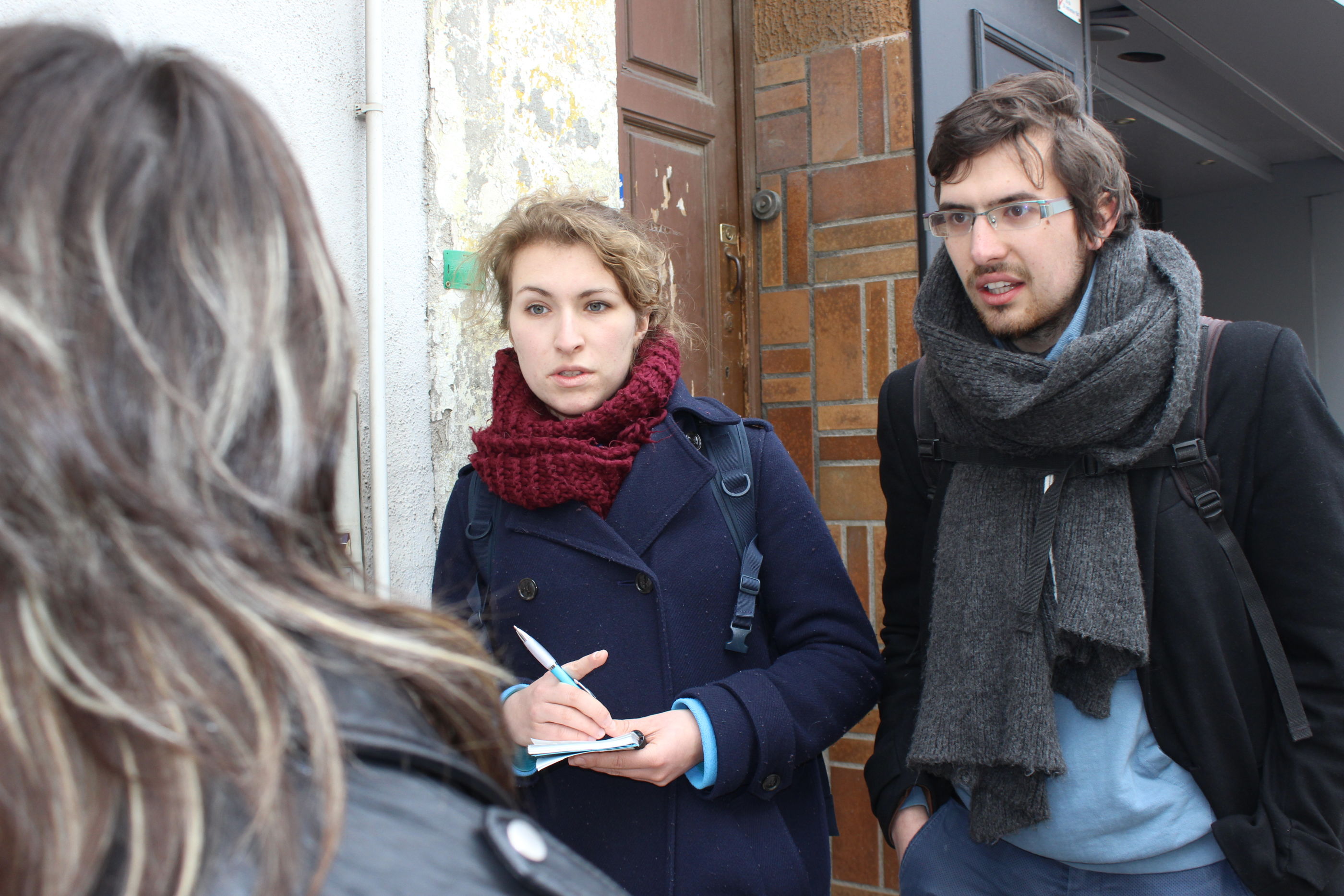
Ariane and Baptiste chat with a couple in Perpignan. © Yena Lee / French republic 24
The idea to set out with an ear to the footing came to Ariane while she was studying European Affairs in London, with the "Brexit" campaign in full swing all effectually her. Even if the debate was streaked through with misinformation, at least at that place was a national discussion about Europe taking place. Information technology had just taken a referendum on membership to spark it. And looking back at her native French republic, where support for the eurosceptic National Front was rising, especially amidst her ain generation, she decided that she wanted to have the conversation nearly Europe before a referendum ended up happening.
When she pitched the seven-month route trip to Baptiste, her long-distance boyfriend in Lille, she was expecting some corporeality of resistance. Instead, he told her to go for it, and Des Europe et Des Hommes was born.
"In the beginning I was a little nervous most what information technology meant for our human relationship," Baptiste confides to me.
This prompts Ariane to grin dorsum at both of usa. "We listen to a lot of music in the car, when we need a interruption from talking. Lots of [French public radio broadcaster] France Inter, we've definitely blown through the French classics by now."
In a way, they represent ii unlike relationships with Europe. Ariane, the daughter of serial expats, had a childhood that shifted from Nigeria, to the Ivory Coast, Poland, the Czech republic, and Hong Kong before finally landing in France. She readily assumes the moniker "third civilization kid", a label that's often applied to describe a generation of globalised young people whose relative lack of identity has become their manner of identifying with each other. When she speaks about Europe, her optics low-cal up in a way that betrays how for her that identity is the 1 that feels the virtually like home.
A randomly selected 'People's Parliament' that could propose laws.
Baptiste, on the other hand, has spent his entire life in northern France – these past few months aside. He grew up in Lille, where he went to public high schoolhouse with Ariane, and has never travelled outside of Europe. Scarf swaying in the wind, he adds that yet, he hasn't ever put much stock in borders.
"They're only physical lines created by humans, and throughout history borders accept inverse all the time," he says. "I feel closer to Belgians than to people from Marseille, for example. The whole notion of a people is something that has never made much sense to me."
Which, of course, is what a huge swath of Eurosceptics fear the European Project is really all near.
We keep walking. A heavyset man passes us and Baptiste wastes no time stopping him. Gruff, unshaven, and with a slight beer-abdomen, the guy doesn't beat around the bush – he's a Eurosceptic. At least, at first impression.
"I want to leave," he says, telling us that as a small-scale-concern possessor, the wage disparity betwixt Perpignan and just across the Pyrenees, in Spain, is killing him. He but can't compete, and he thinks that getting rid of the euro would help. But and so he says something interesting– something that Ariane says happens more often than she originally expected.
"I either want to leave, or I desire there to be more than integration and more convergence. It just needs to equalise out, that's all."
And the European union's trouble is articulate. It tin can motion forrard, or it tin can rewind. But the liminal beingness of one-half-measures is untenable so gets blamed for the lion's share of afflictions that affect struggling regions like French Catalonia.
© Yena Lee / France 24
The offset person to anticipate a specific political and institutional collective was the Maverick prince George of Poděbrady in the early 1460s.
Teach more than European history and civics in school.
He proposed a treaty among all Christian powers, nether which they would pledge to settle differences peacefully, and would institute a common parliament and other institutions. Poděbrady couched his thought as a style to unite the continent against the Ottoman Empire, who had conquered Constantinople in 1453.
The innovative multilateral treaty, the Tractatus pacis toti Christianitati fiendae, or Treaty on the Institution of Peace Throughout Christendom, ultimately failed. And the dream of a united Europe lay dormant for half a millennia, consigned to the avant-garde dreams of writers similar Victor Hugo, who gave a prophetic speech in 1867 where he proclaimed that the twenty-four hour period would come when war betwixt Paris and London would seem equally impossible and absurd as war between Boston and Philadelphia.
"The day will come up," he proclaimed earlier the Paris International Peace Conference in 1849, "When you France, Russian federation, Italy, England, Federal republic of germany, when y'all the nations of the continent, without losing your distinct grapheme and glorious individuality, will come together in unity and establish a common Europe, in the same style that Normandy, Brittany, Burgundy, Lorraine, and Alsace take created France."
There are different theoretical schools of thought about how political community is formed, and nearly how integration might accept place. Functionalism, with its focus on institutions, sees integration similar a ball rolling down a hill – kick the institutions into motion, and "ever closer union" is inevitably the effect. Realism prizes the idea of "power", arguing that states will but come together through coercion or when faced with a common threat. Liberalism sees merchandise, and tying economies inextricably together through commerce, as the answer. And Constructivism centres in on the idea of identity, on producing a "nosotros feeling" that spills across borders, rendering them less and less important.
Europe has incorporated $.25 and pieces of all of the above. But it took a fall from the precipice of civilization and into the ruin of destruction – not just one time, but twice – for Hugo's dream to come truthful. And when it had, even Jean Monnet, one of the fathers of the European Union as we now know it, saw the fundamental fragility that underlay his dream.
"Nosotros have fabricated Europe," he reportedly once said. "Now we must make Europeans." The latter was to bear witness far more than intractable a task.
Hans Magnus Enzensberger, imminent 20th-century High german poet, put his finger on how the idea of a European identity is both bland and imperceptible. "If you took me up blindfolded in a balloon and put me down in any European urban center, I would know information technology was Europe."
To explain how political communities ascend and define themselves, researchers, political scientists and philosophers from John Stuart Factory to Jacques Lacan, to Karl Deutsch have all in i mode or another toyed with the idea that our identities as societies and peoples be in large part in relation to what – and who – we are not. Both Jürgen Habermas and Jacques Derrida in 2002 called on Europe to "otherise" the U.s. as a way of forming a common identity.
A true European defense union.
Even in its origin myth, Europe comes from an "other". Its mythical origin lies in the tale of Europa, a Middle Eastern beauty kidnapped past Zeus in his lust and taken due west, where she gave birth to the continent that bears her name. For the Ancient Greeks, that "other" continued to be Persia to the eastward, against whom they constructed their own identity. And the aftershocks of the partitioning betwixt the 2 classical civilisations nonetheless ripple and writhe today.
Mayhap it's because of those paradoxical cultural beginnings that "European identity" remains and then hard to ascertain, an elusiveness that is integral to the very identity itself. Or to put information technology some other way, "To be European is to be in doubt about identity," as Mathieu Segers, a professor of European History and Integration at the Academy of Maastricht, indicated to me. "For Europe, grace comes through contact with the other, in thought and action." And the corybantic search to ground oneself that follows "builds the cadre of that weak nonetheless extraordinarily persuasive European identity."
How then, to find some sort of emotional commonality, an united states of america not fix necessarily apart from them?
Maybe one answer is travelling abroad, if simply for a while.
The Pyrenees separate Perpignan from Espana. © Yena Lee / France 24
There is a university off-white taking place in Perpignan, and it's full of teenagers. The gates to the venue are almost barricaded with fiddling groups of friends clutching cigarettes – a reminder that, yes, we're still in French republic. They queue to hear pitches from trade schools, grab pamphlets from the national railway operator, the SNCF, and for a few, to gather information about prépas, the two-year programmes that prepare students for the nation's elite grandes écoles.
On the mode in, nosotros stop two loftier school students, both 17, who don't want to give their names. Neither volition be old enough to vote in the upcoming French presidential election, but they will both be eligible to vote in the next European elections. They say they programme to, but voter turnout beyond Europe is depression – 42 percent in France in 2014, and even lower for the 18-24 demographic.
I enquire them if they feel European.
"Yep," the more than talkative 1 replies, as the other slightly nods her head.
And which identity matters to her more, French or European?
"French," she says.
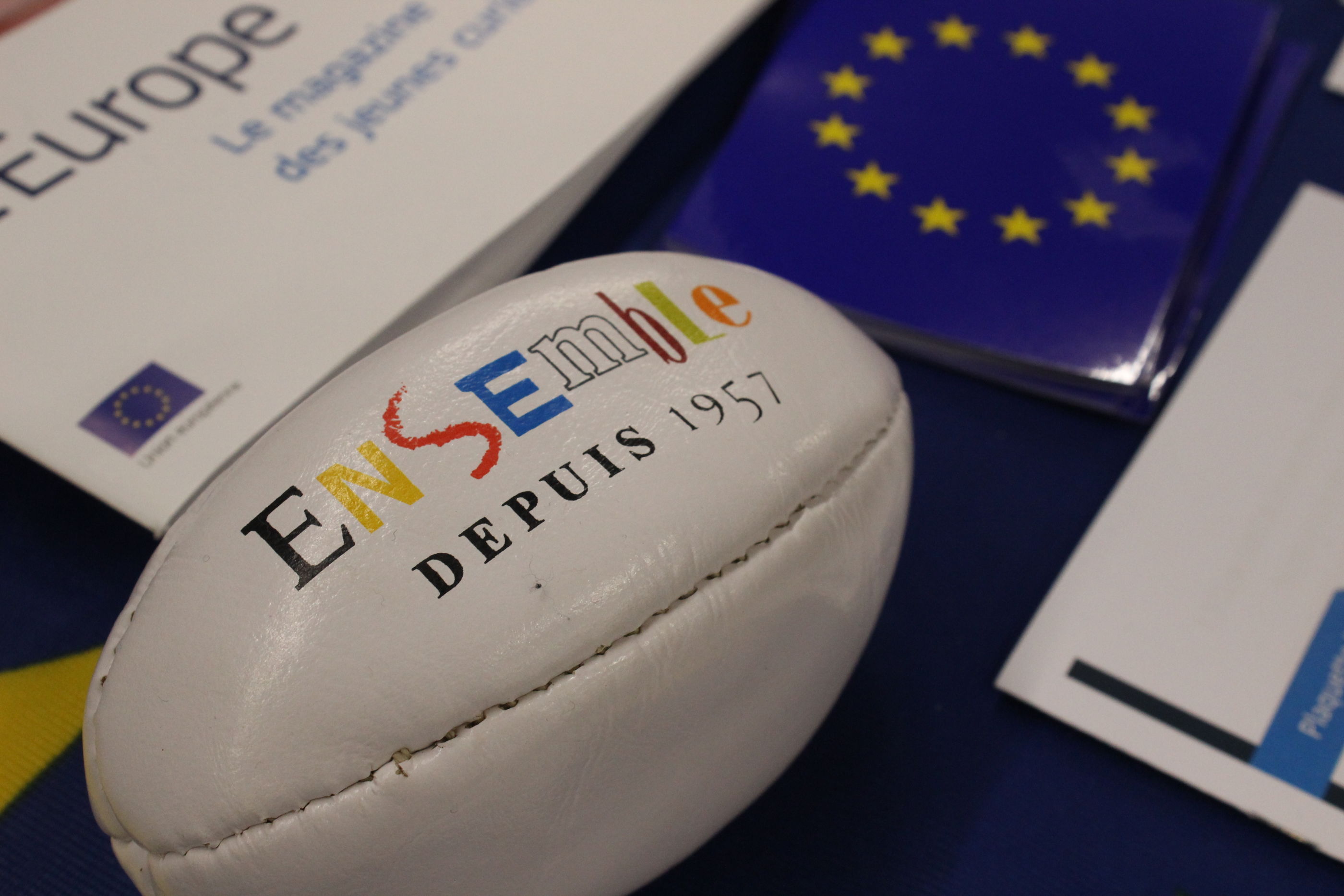
Free knick-knacks for students from Europe Direct. © Yena Lee / France 24
Europe Direct is on the far side of the room, non far from the master doors, with the signature blue EU flag draped over its table and xanthous banners behind. Its mission is to point students towards the plethora of educational opportunities across Europe that they might not be thinking nearly.
"Lots of students come here for data nigh studying abroad," Claire Sarda-Verges, who has headed the Europe Direct, an Eu outreach initiative for 20 years, tells u.s.. She is talking virtually the European Wedlock'southward most significant cultural success – Erasmus, the university substitution programme that was immortalized in the early 2000s French one-act Fifty'Auberge Espagnol ("Pot Luck"). Since its inception, it has drawn millions of participants, and, according to EU estimates, may have resulted in nearly one million babies born to Erasmus couples – a truthful "Generation Europe".
Harmonise labour laws across borders.
This yr she's hawking something new, but forth the aforementioned lines. A Europe-wide volunteer civic service program, which will send participants effectually the continent with housing and a stipend, so that they tin volunteer with a local NGO.
"Europe to them is natural," she continues, "they have a hard time imagining no Europe."
While that might exist true for many, "Europe" wasn't immediately natural for Manon Riffard, a tall, freckled nineteen-year-old volunteer with Europe Straight, who is spending her own year of service trying to convince other people to do one themselves. As the granddaughter of Spaniards who took refuge from Franco across the border in France, her own story is inescapably one that crosses borders. Just it wasn't until she went to live in Peru afterwards high schoolhouse that she felt really, truly European.
"There were people from all kinds of countries in that location, and somehow – I don't know why – the Europeans just gravitated to each other," she tells me, in a way that Enzensberger would relate to. "I can't put my finger on it, but we share something, and you lot tin can sense that more strongly equally soon equally you stride out into the world beyond the continent."
"Pushing Europe is hard hither in the south," Robin confides. He's in his mid-20s, and is a full-time staffer with Europe Direct. "If nosotros brought a commissioner here, maybe that would have an impact, but there's lots of unemployment, and Brussels seems and then far away. People feel similar nobody there is listening to them, or even wants to."
Gonçalo Lobo Xavier, Vice President of Advice for the European Economical and Social Committee, doesn't effort to shirk abroad from that charge. In a long email, he linked the rise of populism and euro-scepticism to "a growing disconnect between 'the European union bubble' and everyday people living in Europe", merely also pushed back against the idea that Europe doesn't actually care.
His organization the EESC, is supposed to be the EU'southward bridge to civil society—i.e., on the ground engagement—in European nations. Recently, he told me, it has embarked on an initiative called "Going Local," and sending its staff exterior of Brussels to connect with organizations on the ground. Hundreds of visits, but those are "only the formal reported figures," he emphasized – the majority of EESC "members" are already local.
"And believe me," his email concludes, "this is our added value. We belong to 'existent life' and we bring it to Brussels."
Ariane and Baptiste might not be officially connected with the EU, but they hope that their observations also will filter back to Brussels. Or that fifty-fifty their admitting brief presence volition change, in some small way, what people feel. Simply as the project has changed their idea most what Europe might still be.
European management of counter-terrorism efforts.
"Communication is obviously a missed opportunity," Baptiste tell me weeks afterwards over the phone, from Corsica.
"Simply i surprising thing we accept learned is not to underestimate what people want from Europe," Ariane chimes in. "In general, there is less euroscepticism - especially afterward Brexit - than we were expecting to find when we started."
Her observation isn't scientific or grounded in annihilation beyond five months of anecdotes, merely after a yr of almost worthless polling, maybe an ear to the ground can reveal something truer that reams of statistically significant studies.
"People desire to engage, simply sometimes they aren't sure how," she finishes.
People, like the immature couple in Blagnac, exterior of Toulouse, who circled a park four times with them in order to have an hour-long conversation. An older man with a ZZ Top beard in Chenançeau, who stopped his 4x4, got out and invited them into a café to take a more in-depth discussion. The couchsurfers (they rely on couchsurfing for a place to sleep every night) who decided spontaneously to host a big community discussion on Europe, and went to every door in their apartment edifice to invite all of their neighbours.
Blaming the woes of the EU on communication seems like too piece of cake an out, though. Whatsoever government that fails to win the hearts and minds of the authorities is destined not to last. But greater engagement with Europe's citizens won't, for instance, fix the structural problems with the euro that take driven massive merchandise imbalances between Federal republic of germany and her neighbors, and pushed periphery economies--like Greece--into painful internal devaluation.
Nor will information technology resolve member country disagreement over refugees, migrants, integration at varying speeds, and whether European defence policy should replace NATO, stem the rise of nationalism and populism that has become the unavoidable sidecar of globalisation, or magically arts and crafts a greater sense of solidarity and common identity among peoples starkly different regional and national histories.
"You know what I've learned from all of this?" Baptiste tells me all of a sudden. "To be patient."
Information technology's one matter Europe probably needs from Europeans, simply that so many of them are running out of. And with then trivial fourth dimension to spare.

Source: https://webdoc.france24.com/seeking-europe-future/
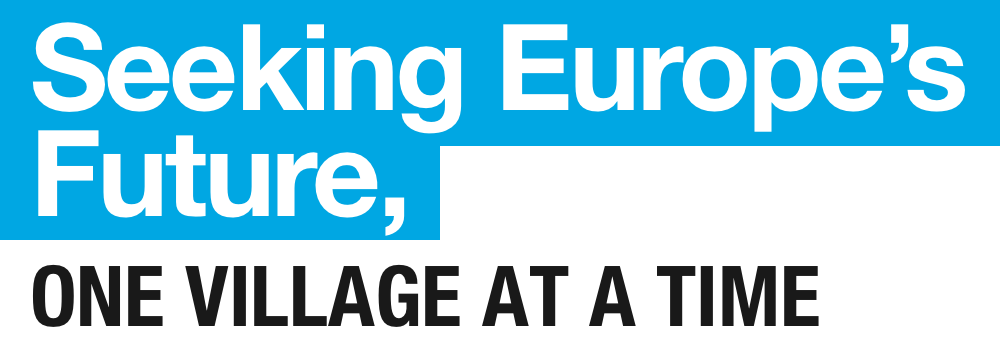
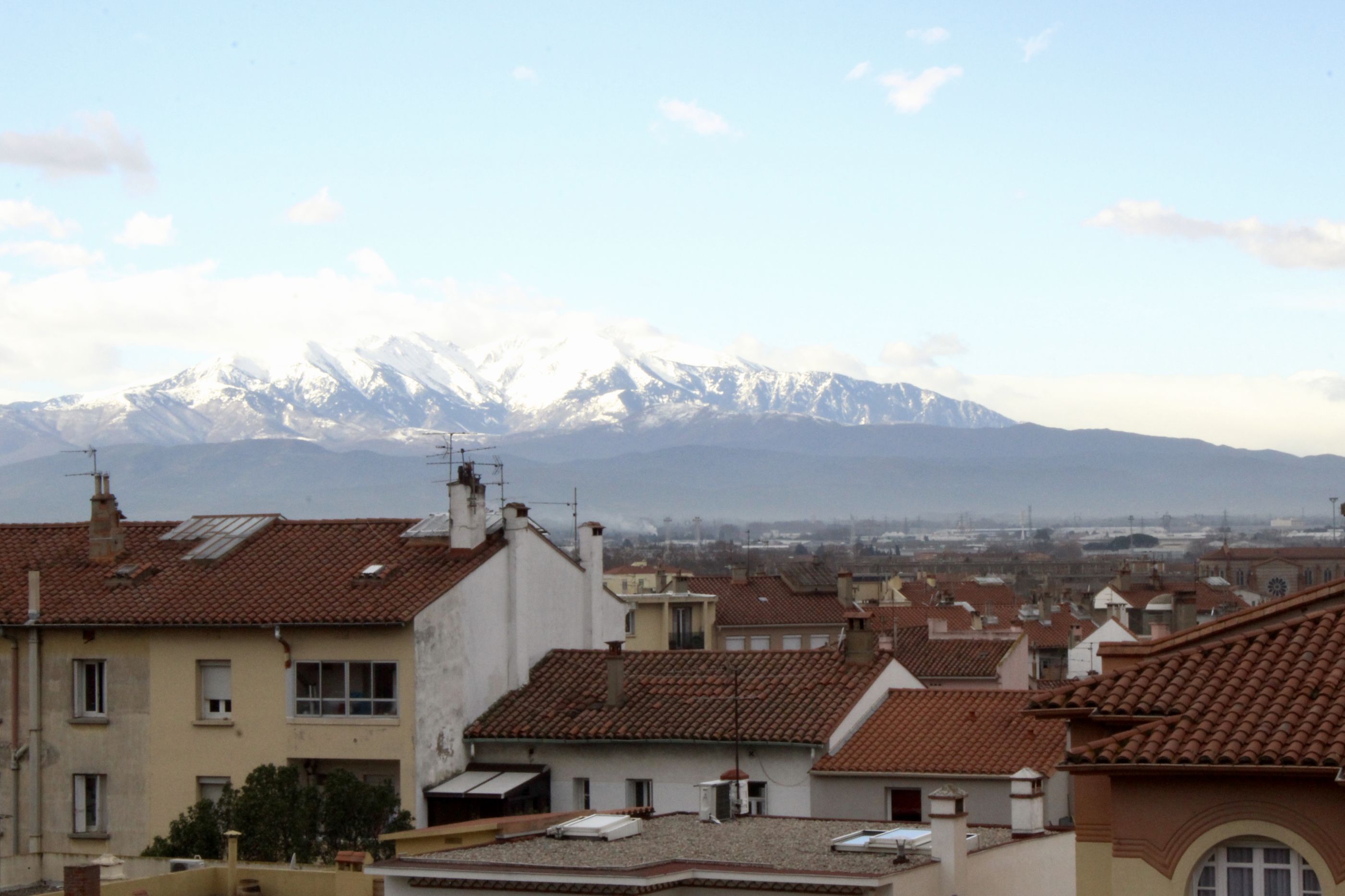
0 Response to "Will France 24 Be Seen in Philadelphia Again"
Post a Comment